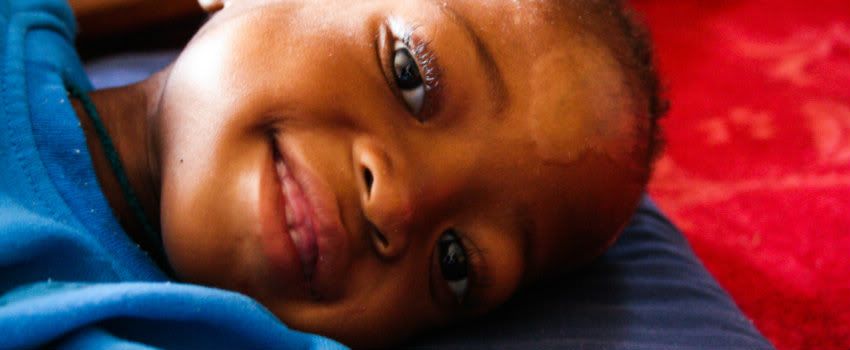What a work day.
Yesterday morning, Kirsten and I decided to spend our day tagging along with one of TTL's outreach teams.
Here at TTL, outreach is the bulk of what we do. While the safe home in town is a vital safety line for the most vulnerable children we come across, outreach links us to the majority of our young clients who still live at home or with relatives in the rural countryside.
Every day, multiple cars leave TTL and embark on hours-long journeys up and down jaw-dropping and head-rocking unpaved roads in order to touch base with and deliver food to some of the youngest victims of the HIV/AIDS epidemic in the country. Each jolt on the road out to those clients is one step of progress toward our mission.
I was aware of all of this on our way out of town, and thought I had a pretty good sense of what I would encounter during the rest of the day. I just didn't imagine finding little Selloane.
The pavement ended not far outside town, when we turned off the main road. The rest of the 2.5 hour trip was made on a rock and dirt road that slithered along the long green slopes of the undulating mountains, about half-way between the gullies below and the rocky peaks above.
Most stretches of the road are only a sliver of leveled ground, made flat by stacked-rock walls on the downhill side and compacted dirt and rocks beneath the tires. (The tires, by the way, have life-spans of months here, not years.)
Our first stop was Moeketsane Clinic, a rural medical outpost where we stopped to see if there were any referrals to TTL. This day, there weren't.
Our next stop was in a small gathering of rondavals, or small round stone structures with thatched roofs, where one of TTL's young clients lives with his family. We were there to deliver "plumpy nut," or a peanut-buttery superfood for hungry babies.
After we measured the little boy's height, weight and MUAC, or middle upper-arm circumference -- three numbers that can be used to assess health and nourishment based on age -- we walked back to where the TTL car was parked to give his grandmother (and primary caregiver) the "plumpino."
It was then that the woman told us there was another sick baby, just a few rondavals away, who was also being taken care of by her grandmother. The tiny girl was not already a TTL client, so we decided to go check her health.
Shortly after walking into the dark, smoke-scented rondaval, we knew she needed our help. At two-and-a-half years old, little Selloane was only 6.7 kg, or just under 15 lbs. For her height and gender, that meant she was severely underweight. Seeing her spindly arms and legs was an emotional sight.
Selloane's yellow Bukana, or health booklet, showed the local clinic had suggested she be taken to the hospital a week or two prior, but the grandmother said transportation could not be arranged or afforded. (It was slightly frustrating that the clinic hadn't referred Selloane to TTL.)
Selloane's mother was gone, working somewhere in Maseru, and the grandparents did not know the mother's HIV status. Little Selloane had never been tested.
Kirsten and I conferred quickly with Matello, our lead outreach worker, and we all came to the same conclusion: The child should be taken to the hospital immediately -- by us.
After discussing this with the grandmother, we headed off to meet three other TTL clients and their mothers back at the clinic, where we distributed some more food and formula. Selloane's grandmother prepared herself for the long trip to Mokhotlong, then walked with her granddaughter to meet us at the clinic.
Not long after, we were all in the TTL car together. Little Selloane cried at first, then got tired and slept wrapped in a traditional blanket in her grandmother's lap. She occasionally woke again during some of the roughest parts of the road, and cried in an unsteady pattern of labored moans.
Last night, both Selloane and her grandmother stayed the night at the Mokhotlong hospital, which is next door to TTL.
I'm not sure how long their stay there will be. But it wouldn't have happened without TTL picking up the hospital and transport bills.
Perhaps equally important, little Selloane will now be a TTL client. Next time an outreach team finds her, it will be for a planned check up, and we'll likely have food or other resources in hand to give her grandmother.
Selloane will also be tested for HIV, so we'll know her status and can design a contact plan with it in mind.
This is TTL's work firsthand. What if we hadn't found her?


1 comment:
great post kevin. glad you had a good first day on outreach.
Post a Comment